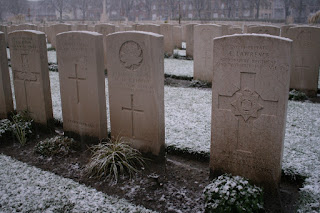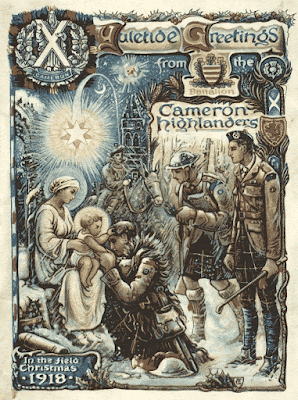New Year’s
celebrations are marked by noise:
fireworks, the banging of pots and pans, noisemakers, and the happy
revels of party-goers. One-hundred years
ago, sixteen months after the start of the Great War that was to have been over
by Christmas of 1914, Ada May Harrison wrote a short New Year’s poem, “Those that go down into silence.”
Very
little is known about Ada May Harrison: she published a scholarly work on Anne
Bronte and wrote several children’s books (among them one with the intriguing
title of The Adventures of Polly
Peppermint). Several of her books were
illustrated by her husband, Robert Austin, an artist and printmaker who designed the ten shillings and one-pound notes issued
in the early 1960s. He fought in the First World War and survived.
 |
| Ypres Reservoir Cemetery |
(A reading of the poem is available here.)
New
Year, 1916
Those that go down into silence….
There is no silence in their going down,
Although their grave-turf is not wet with tears,
Although Grief passes by them, and Renown
Has garnered them no glory for the years.
The cloud of war moves on, and men forget
That empires fall. We go our heedless ways
Unknowing still, uncaring still, and yet
The very dust is clamorous with their praise.
Although their grave-turf is not wet with tears,
Although Grief passes by them, and Renown
Has garnered them no glory for the years.
The cloud of war moves on, and men forget
That empires fall. We go our heedless ways
Unknowing still, uncaring still, and yet
The very dust is clamorous with their praise.
The first line of the poem – or perhaps it is
an elaboration of the title – is taken from Psalm 115:17: “The dead praise not
the LORD, neither any that go down into silence.” The dead are silent, and yet the poem asks
us to remember that their death was not peaceful, but most likely accompanied
by the deafening roar of artillery shells, machine guns, and explosions.
This is a poem that warns about forgetting. Marking the new year, those who are living look ahead to the future. Even the cloud of war has moved on, and the graves of the thousands upon thousands of the dead are not "wet with tears," but neglected. And yet...the poem closes with the assurance that the very ground in which the soldiers lie will loudly shout their praise.
This is a poem that warns about forgetting. Marking the new year, those who are living look ahead to the future. Even the cloud of war has moved on, and the graves of the thousands upon thousands of the dead are not "wet with tears," but neglected. And yet...the poem closes with the assurance that the very ground in which the soldiers lie will loudly shout their praise.
Short and poignant, the poem challenges readers to remember the dead. It protests against indifference and callousness as it asks all who live to celebrate the new year to join with the dead in silence, to pause and consider those who sacrificed their futures on the battlefields of the First World War.














